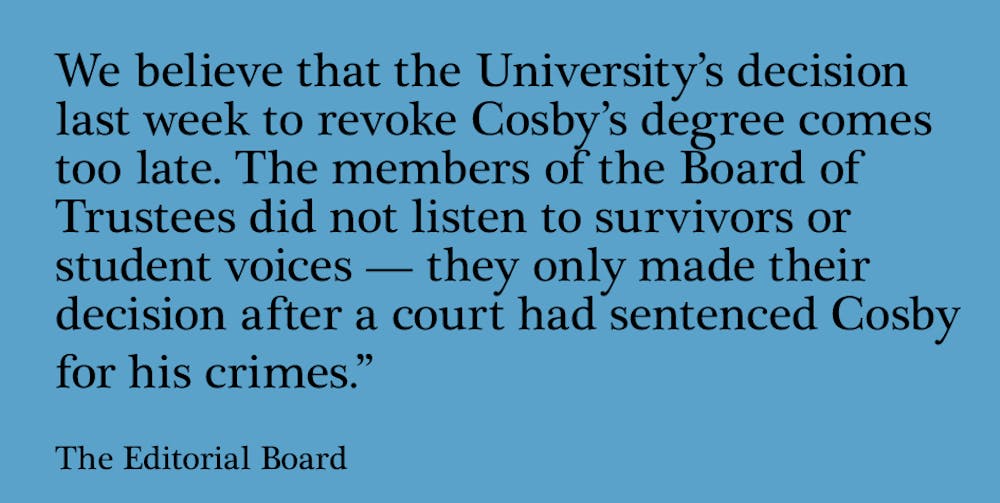Last Thursday, following decades of accusations from over 50 survivors of sexual assault and years of courtroom battles, a Pennsylvania jury finally found Bill Cosby guilty on three counts of felony aggravated indecent assault, which include sexually assaulting a woman he had drugged in 2004.
Cosby, the comedian who has been called “America’s Dad,” received an honorary degree from the University in 2004 and spoke at that year’s commencement. Following last Thursday’s conviction, the University’s Board of Trustees voted to revoke the degree. The University also released a statement that day which read, “At the time the honorary degree was conferred, the university was unaware of the allegations that Mr. Cosby sexually assaulted dozens of women over decades.”
While the University may have been unaware of those allegations in 2004, it was most certainly aware in 2015, when members of the Sexual Assault Resource Unit (SARU) and Cosby survivor Lili Bernard met with Secretary of the Board of Trustees Maureen Marsh and General Counsel Paul Pineau to voice their concerns.
At the time, at least 13 other universities had already rescinded honorary degrees they had bestowed upon Cosby, and many students called upon our University to follow suit.
The 2015-2016 Student Government Association passed a resolution demanding that Hopkins rescind Cosby’s degree, writing that “it fundamentally tarnishes the name and reputation of The Johns Hopkins University to continue to allow Mr. Cosby to maintain the distinction of holding an honorary degree from our institution.”
That same academic year, The News-Letter wrote an editorial calling for the University to rescind the degree and take a stance against sexual assault. When we followed up on this story in February, the University responded with a statement which read, “As stated previously, Johns Hopkins has a set of values we seek to uphold and we continue to closely monitor all developments related to this matter.”
We believe that the University’s decision last week to revoke Cosby’s degree comes too late. The members of the Board of Trustees did not listen to survivors or student voices — they only made their decision after a court had sentenced Cosby for his crimes.
The University’s belatedness in rescinding Cosby’s degree plays into a larger trend of disregarding student opinions. At times, it feels like our voices enter the void of the University and a unilateral decision emerges with some banal response like, “we will closely monitor all developments related to this matter.” The University releases vague statements that do little to explain how they consult us. We are left to wonder: How does the University take student voices into consideration?
When our reporters asked University President Ronald J. Daniels this very question last Thursday, he answered: “I’m actually hard-pressed to think about an issue that the student body saw as really significant and that we were unable to get thoughtful and impactful student voices into those conversations, whether through task forces and commissions, an open forum, town hall or other venue.”
We, on the other hand, are hard-pressed to think of a time when the University actively considered student input before a major decision was made. Students and administrators clearly have different ideas about what “student input” actually entails.
The News-Letter has reported on many instances in which this disparity in viewpoints manifests. In March, when the University announced its intent to create a private police force, students planned protests and testified in front of the Maryland General Assembly. In October 2016, when the University announced that the Humanities Center might face closure, graduate students organized protests throughout the fall semester. In May 2016, when the University announced that it would discontinue its covered grades policy, students denounced the lack of input and again, organized in opposition to a University act.
We are tired of reporting on a cycle in which the University announces something and students are forced to make their voices heard. This does not seem like active student input. It seems like a decision is made without our voice, and then we must fight to make sure that the University listens.
We believe that student input is invaluable in University-level decisions, because we are often directly impacted by them. It is not enough for students to merely respond to decisions. Students must be given an equal seat at the decision-making table and an equal platform on which to raise their voices.





